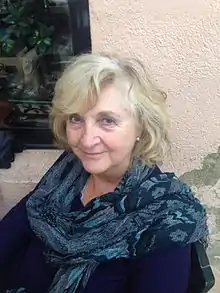Mary Nash (historian)
Mary Josephine Nash Baldwin (born 1947) is an Irish historian living in Catalonia. She has specialized in the study of the history of women and feminism in Spain.[1][2]
Mary Nash | |
|---|---|
 | |
| Born | Mary Josephine Nash Baldwin 1947 (age 75–76) Limerick, Ireland |
| Nationality | Irish and Spanish |
| Alma mater | University of Barcelona |
| Occupation(s) | Academic, writer |
| Employer | University of Barcelona |
| Awards | Creu de Sant Jordi (1995) |
Biography
In 1967, she graduated from the National University of Ireland, and in 1975 she obtained a licentiate in philosophy and letters at the University of Barcelona. She received her doctorate there in 1977 in the specialty of modern history, with the thesis La mujer en las organizaciones políticas de izquierdas en España, 1931-1939. In 1982, she was one of the founders of the Women's Historical Research Center at the University of Barcelona.[3]
In 1984, she won the Emilia Pardo Bazán prize for her work Presencia y protagonismo. Aspectos de la historia de las mujeres. In 1995, the Generalitat de Catalunya awarded her the Creu de Sant Jordi.[4] In 2008 she received the President Macià Working Medal.[5] In 2010 she became a Doctor Honoris Causa at the University of Granada.[6]
She is one of the directors of Arenal, Journal of Women's History, has collaborated with UNESCO, and was president of the Spanish Association for Women's History Research (AEIHM) from 1991 to 1997.[7]
She is a Professor of Contemporary History at the University of Barcelona.[1]
Books
- Mujer y movimiento obrero en España. Barcelona: Fontamara, 1981.
- Experiencias desiguales: conflictos sociales y respuestas colectivas: siglo XIX. Susanna Tavera, Mary Nash. Madrid: Síntesis, 1994.
- Defying Male Civilization: Women in the Spanish Civil War. Denver: Arden Press, 1995.[8][9]
- Rojas: las mujeres republicanas en la Guerra Civil española. Madrid: Taurus, 1999 (Spanish version of Defying Male Civilization: Women in the Spanish Civil War (1995); translated by Irene Cifuentes,[10] as the basis of her doctoral thesis.[11]
- Mujeres en el Mundo. Historia, retos y movimientos. Madrid: Alianza, 2004.[12][13]
- Inmigrantes en nuestro espejo: inmigración y discurso periodístico en la prensa española. Barcelona: Icaria/Antrzyt, 2005.
- Dones en transició: de la resistència política a la legitimitat feminista: les dones en la Barcelona de la Transició. Barcelona: Ajuntament de Barcelona, 2007.
- Trabajadoras: un siglo de trabajo femenino en Cataluña [1900-2000]. Barcelona: Generalitat de Catalunya, 2010.
References
- Moltó, Ezequiel (11 November 2003). "Las mujeres de la Guerra" [The Women of the War]. El País (in Spanish). Retrieved 28 August 2018.
- Olábarri Gortázar, Ignacio (2013). "De la Historia de la Historia de España...y de los historiadores" [About the History of the History of Spain...and About the Historians]. Memoria y Civilización (in Spanish) (16): 286. ISSN 1139-0107. Retrieved 28 August 2018 – via ProQuest.
- Jita Allan, Tuzyline (1997). Women's Studies Quarterly: Teaching African Literatures in a Global Literary Economy. Feminist Press. p. 280. ISBN 9781558611696. Retrieved 28 August 2018 – via Google Books.
- Arenal: revista de historia de las mujeres, Volumes 3-4 (in Spanish). University of Granada. 1996. p. 348. Retrieved 28 August 2018 – via Google Books.
- "El president Montilla lliurarà demà les Medalles i Plaques al treball President Macià en reconeixement als mèrits laborals a 22 persones i 7 empreses" [President Montilla Will Give President Macià Working Medals and Plaques in Recognition of Good Deeds to 22 People and 7 Companies Tomorrow] (in Catalan). Generalitat de Catalunya. 27 November 2008. Retrieved 28 August 2018.
- "Doctores Honoris Causa investidos por la UGR" (in Spanish). University of Granada. Retrieved 28 August 2018.
- "Homenaje a Mary Nash" [Tribute to Mary Nash] (in Spanish). Spanish Association for the Women's History Research. Retrieved 28 August 2018.
- Radcliff, Pamela (Fall 1997). "Reviewed Work: Defying Male Civilization: Women in the Spanish Civil War by Mary Nash". International Labor and Working-Class History (52): 190–193. doi:10.1017/S0147547900007158. JSTOR 27672427. S2CID 144770892.
- Halevi, Sharon (March 1998). "Plus Ca Change, Plus C'est La Meme Chose" [What Goes Around Comes Around]. H-Minerva, H-Net Reviews. Retrieved 28 August 2018.
- Rodríguez, Pilar (Spring–Fall 2000). "Reviewed Work: Rojas: las mujeres republicanas en la Guerra Civil by Mary Nash, Irene Cifuentes". Letras Femeninas. 26 (1/2): 223–225. JSTOR 23021102.
- Nash, Mary; Benach Rovira, Núria (2006). "[Feminismos del siglo XXI] Mary Nash". Lectora: Revista de Dones I Textualitat (in Spanish) (12): 101–106. ISSN 1136-5781. Retrieved 28 August 2018.
- Benach Rovira, Núria; Tello, Rosa (2004). "Mujeres en el mundo. Historia, retos y movimientos, Mary Nash". Lectora: Revista de Dones I Textualitat (in Spanish) (11): 283–289. ISSN 1136-5781. Retrieved 28 August 2018.
- García Chourio, José Guillermo (July–December 2008). "Reseña de 'Mujeres en el Mundo. Historia, retos y movimientos' de Mary Nash". Procesos Históricos (in Spanish) (14). ISSN 1690-4818. Retrieved 28 August 2018.